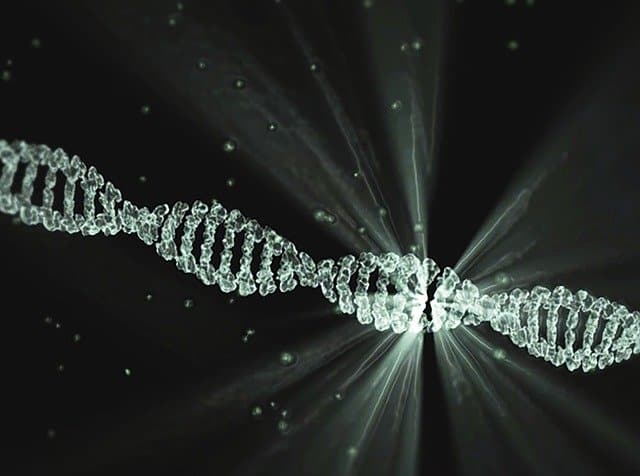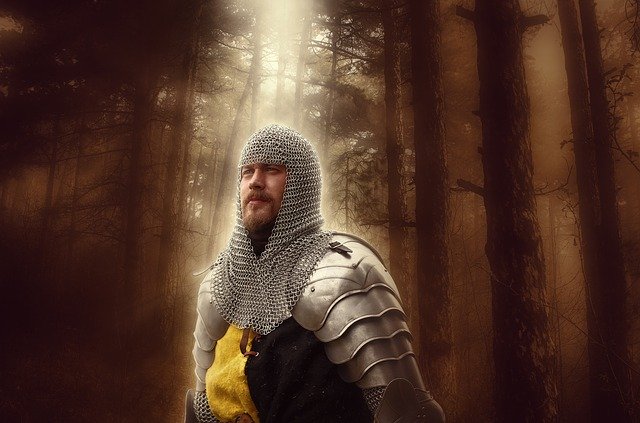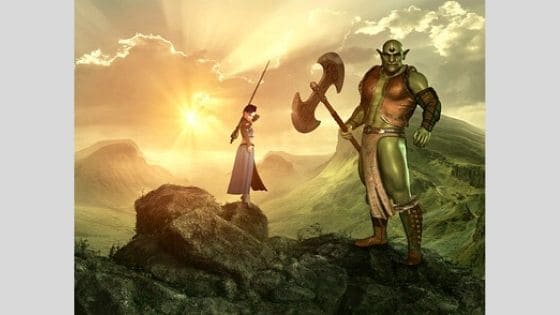Diversity in D&D has always existed and this article by Wizards about how they address diversity in D&D is completely wrong. Taking away evil in some of the races will completely change the world and make it less diverse.
Diversity in D&D has always existed, and Wizards of the Coast’s stance of just getting rid of evil races disallows others to create a richer world.
D&D has an interesting set of rules, species, and world that is different than ours. In it’s difference is a diverse reflection of our own world, but is at the same time it’s own unique world. We need to look deeper into D&D and try to figure out the differences between race in D&D and race in our world as well as the concept of evil.
The main differences between our world and D&D
Wizard’s stance on diversity in D&D makes sense on the surface. They want to get rid of evil races and make the world more interesting/diverse. On the surface it seems great, but analyzing the D&D world will give us an entirely different perspective on the impact this stance will have.
The article will go into 5 sections. These sections will consider if what Wizards of the Coast’s stance on taking out evil races is a good idea or bad idea.
- Species vs race.
- Evil as a culture.
- A deeper analysis of culture.
- The real issue.
- How to fix negative perceptions.
The world of D&D is not the same as ours.
That is a very important idea to keep in your head as we discuss this stance on taking away evil races. Wizards of the Coast stated that they will include ‘sensitivity readers’ for the future in order to not to cause any offense.
The issue with this is that the sensitivity readers are reading from a perspective of race and the real world. They are not looking at or considering the differences between the world of D&D and our real world. Thus, their stance on ‘race’ will be incorrect.
It is sort of like asking a psychologist to answer an economics question. Yes, psychology may be part of understanding an economic issue but an economist would be better suited to do so.
This is exactly what is happening with the idea of sensitivity readers.
So, instead of just stating that there are differences, let’s dive into the differences between D&D and the real world to find out if we should actually get rid of evil races or no.
Race vs Species.

In our real world race is just a difference in outward appearance. We might come from different cultures and have different facial/skin features, but biologically we are all the same. We have the same life expectancy, capability, etc. We are all the same species.
The ‘races’ in D&D are not different races. They are different species. This is an extremely important difference! Elves are biologically wired differently. They live longer, don’t need to sleep, and can do things that humans cannot.
Orcs have biological differences as well, and if you are trying to compare races in D&D to races in the real world it is inaccurate. It is exactly like comparing apples to oranges. Apples are intrinsically different than oranges, and have different chemical compesitions.
Different species also have to deal with different issues. Orcs may actually be more inclined to be aggressive. This isn’t racist, but instead a fact of their species. We as humans are prone to self destructive behaviors, and thus others species can be prone to different self destructive behaviors.
Attributing ‘humanity’ to these different species is scientifically wrong.
That is how these species can be innately evil. They are biologically different from us and may even be constructed by an evil god. If you were created by an evil god, it is likely that you will innately be evil. We do not have this in our world, and there are even more differences than just this.
Evil as a culture
Would you say that human culture is evil, neutral, or good?
We are definitely lawful as a species, but what else are we? If you are pessimistic you would most likely say that humanity is neutral. We as a whole do not want to live our lives by stepping over each other to achieve what we want. We are definitely not evil, and most likely we are actually a good race.
Think about this for a second. If we are innately a neutral or good race, then what would an evil race look like? How would it function? Would it work or just be a boring attempt for DMs?
Evil as a culture is possibly the greatest set of Diversity in D&D that we could ever hope for.
Evil as a culture adds a set of diversity and depth to the D&D universe that we do not have in our real world. In fact, evil cultures are more interesting than most human cultures!
Think of your D&D world. When you try to make or get information about human civilizations it is boring, hand waved, or some regurgitated culture that is not very interesting. Evil culture is extremely interesting by comparison.
For the drow, they have a cast system, followed by differences in each social level, followed by different ideas on how to live life, followed by different opinions in each outpost or city away from the capital. It is far more complex than this and an endless rabbit hole of information that gives an interesting start for most DMs.
Orc culture is nomadic in nature. They travel the tundras, grasslands, deserts, and more never settling. Why are they nomadic? Each or group has some similarities, but they are extremely diverse.
Evil races give an easy start for new DMs on figuring out how to make a culture since evil cultures are more defined and interesting than human cultures.
Taking away the ‘evil’ from these races erases the core identity of how they function. It would be like taking away democracy from America. America would not be the same.
This then leads us to a deeper analysis of culture.
Deeper look at culture
D&D has always been about having the players think and become smarter. We don’t need to whitewash and bore the D&D races by having them all be the same. Some sentient races are evil. It makes sense. But how can you tell?
This is entangled with D&D’s roots. The power fantasy.

Players wanted to be the heroes to stop the bad guys. Sounds simple, but what is more menacing. An evil villain who controls an army of idiots, or an evil empire full of capable individuals?
We have always known that the evil empire is a more daunting task, and DMs in the past have figured out how to make evil empires. We established that different species can be evil for various reasons above, but how does this give more diversity in D&D?
This increases the options that players and DMs have in order to create an interesting story. They don’t have to just be in a story with an evil bad guy or the loose natives that are inherently evil. We have other societies like hell which contains devils and the abyss which contains demons, but why not make the world more diverse? Why not add another element that is close to our real world, but just distant enough to not be frightened by it?
Players are able to pick apart the evil deeds that evil cultures do and fight against it in D&D, but also apply that knowledge to our real world. We too often let evil injustices go unpunished. We are bi standards when we should stand up, and D&D helps teach people to stand up to these evil actions if they ever occur.
What makes these cultures and species even more fascinating is that not every evil creature is irredeemable. Players can play a good version of an evil race and have an interesting story there. It tells of how they are good when the rest of the race isn’t and makes the line of being ‘evil’ more complex.
By taking away evil races we are robbing players of this opportunity to shape the very world through their own story, and that isn’t adding to diversity in D&D. It is taking away from it.
The real issue
If this is the case, then why is Wizards trying to take away evil races? Why not make the world more diverse instead of just letting sensitivity readers who have not looked at the D&D world closely make sweeping judgement to take away a lot of it’s charm?
Wizards of the Coast doesn’t want to seem racist, and doesn’t want to be a part of the discussion.
Taking away these evil races just makes them not be a part of the discussion. If someone can draw similarities between our real world and D&D, then they are are able to discuss it and improve the D&D world. We can’t do that in our real world, and it provides an opportunity for people to see and understand racism while doing something about it.
Even though everyone is a different species, they should still be treated somewhat similarly. That is the narrative we often go with, and we can find ties to racism in D&D and our real world. Just check our article on racism in D&D to learn more about it.
Even though we can learn about racism when we otherwise wouldn’t (I wouldn’t have learned about racism for a long time if it wasn’t for D&D) Wizards still doesn’t want to be a part of the discussion. But why not?
Well, the answer is a bit of a blight on D&D. D&D has sentient evil races, and that is a good thing. The only problem is with how they are handled.
Most of the D&D evil races are of darker complexion.
Drow, Duregar, etc they are black or dark colored skin. Other races share similarities to oppressed minorities in our world, and they have taken the response of these races to the extreme. It honestly makes sense in the D&D world that these races would act the way they do, but what can we do about it?
Fixing negative perceptions
If you want to add diversity in D&D you can’t just whitewash history. Saying one day that ‘they were actually different and always like this’ doesn’t work. That only works in books like 1984. We in a free democratic society know how these species have been for the past 4 decades, and that will not change.
Instead of trying to change history and spend effort to completely re-write the culture and histories of these species, why not make other evil races that make the world more diverse?
Make evil races that are of lighter skin tones and make the world a more complex, diverse, and interesting place. Don’t Just take away. Instead, add more than there ever was before!
If Wizards of the Coast is serious about adding diversity to D&D, then they need to actually add diversity in stead of try to whitewash history.
Conclusion
Wizard’s stance on adding diversity in D&D is not well thought out.
They are taking away from the diversity of the D&D world and trying to whitewash history instead of making it more diverse.
There are ways to make D&D more diverse and enrich the world/lore of D&D, but just taking away the evil from different races or species is not the way to do it.
Sometimes we make mistakes. This mistake is thinking that species and race are the exact same. It is also thinking that the D&D world is the exact same as our own. It is not, and these are important issues to consider.
Understanding what is evil, racist, and making players think more deeply about these issues is something that D&D has always done. It has helped improve our society today by trying to improve the society of the D&D world, so please Wizards. Don’t stop trying to improve our world by taking away evil sentient races.
This has been Wizo and until next time keep rolling!




